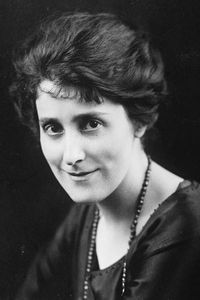Winifred Ashton, a celebrated English literary figure, is more commonly recognized by her pen name, Clemence Dane. Born on February 21, 1888, she embarked on a journey of artistic exploration, initially studying the fine arts in London and later in Germany. After acquiring a comprehensive understanding of her craft, she returned to England, where she dedicated her time to teaching at a prestigious girls' school.
Clemence Dane's literary journey commenced following the conclusion of the First World War, during which she adopted the pen name "Clemence Dane" as an homage to the historic church of St Clement Danes situated on the renowned Strand in London.
Her inaugural novel, "Regiment of Women", was published in 1917, presenting a nuanced portrayal of life within the confines of an all-girls' educational institution.
This debut literary endeavor was subsequently followed by the publication of "Legend" in 1919, a thought-provoking narrative that delves into the lives and interactions of a group of acquaintances as they collectively ponder the significance and lasting impact of a deceased friend's existence and professional accomplishments.
Dane's groundbreaking theatrical production, A Bill of Divorcement, initially premiered on stage in 1921, weaving a poignant narrative that revolves around the selfless dedication of a devoted daughter towards her mentally troubled father. This seminal work would later be reimagined for the silver screen in 1932, featuring iconic performances by Katharine Hepburn and John Barrymore.
In addition to her notable achievements in playwriting, Dane also demonstrated her versatility by crafting screenplays and novels. Her collaborative efforts on the screenplay for the cinematic adaptation of Anna Karenina, starring the incomparable Greta Garbo, further solidified her reputation as a talented and multifaceted creative force.
Dane's illustrious career surged to unprecedented heights with a prestigious Academy Award win, shared with Anthony Pelissier, for the critically acclaimed film "Vacation from Marriage", also released in the United Kingdom under the title "Perfect Strangers", which boasted an impressive cast featuring renowned actors Robert Donat and Deborah Kerr.
In addition to her cinematic achievements, Dane also demonstrated her versatility as a writer by penning three gripping detective novels, which introduced the world to her beloved creation, the esteemed Sir John Saumarez, alongside the talented Helen de Guerry Simpson.
Noted British playwright and actress, Dane, left an indelible mark on the world of theatre, her impressive career spanning numerous esteemed endeavors. A valued member of the prestigious Detection Club, she played a significant role in the club's serial publications, specifically contributing to the popular series The Scoop and The Floating Admiral. Her remarkable creative output culminated in her final play, Eighty in the Shade, which was specially penned for and starred the renowned Dame Sybil Thorndike, a testament to the enduring friendship and mutual respect between the two theatrical luminaries.
Dane's life and legacy have been deeply intertwined with that of his close friend, the renowned playwright Noël Coward. In fact, it is widely believed that Dane served as the inspiration for the eccentric and enigmatic character of Madame Arcati in Coward's iconic play, Blithe Spirit. This fascinating connection not only speaks to the depth of their friendship but also highlights the profound influence Dane had on Coward's work.
The National Portrait Gallery is home to a remarkable collection of artworks related to Dane's life and career. Two portraits of Coward, painted by Dane himself, can be found within the gallery's walls. Additionally, a captivating painting of Dane, created by the esteemed artist Frederic Yates, is also on display. These remarkable works not only provide a glimpse into Dane's life and artistic pursuits but also serve as a testament to the enduring legacy of his friendship with Coward.
Notwithstanding her remarkable achievements, Dane's reputation was often defined by her propensity for making innocent yet indecent comments, frequently utilizing words in a manner that was unintentional and unintended, which often led to amusing and unexpected consequences.
Her literary output was truly remarkable, as she penned a staggering number of plays, exceeding thirty in total, and novels, amounting to a total of sixteen, prior to her passing on March 28, 1965, in the city of London, a place that held a special significance for her.
Dane's later years were marked by a remarkable literary endeavour, as she penned a comprehensive tome on the storied history of Covent Garden, a publication that would eventually see the light of day in 1964 under the captivating title, London has a Garden.























